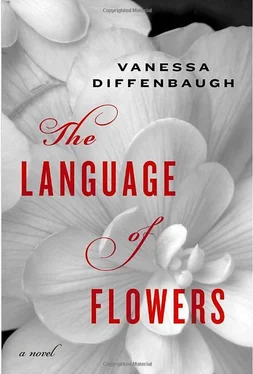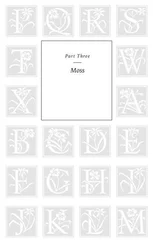I hated that Elizabeth was such a good cook. She kept me so well fed that I had yet to go back for the American cheese in my desk drawer. The pears on the plate were peeled and cored; the muffin was full of warm chunks of banana and melted peanut-butter chips. I ate every bite. When I finished, I traded the plate for a glass of milk.
“There,” she said. “Now you should be able to work for as long as it takes to remove every spine from the insides of my shoes.” She handed me two leather gloves that were much too big for my hands, a pair of tweezers, and a flashlight. “When you’re done, you’ll put them on your feet and walk up and down the steps three times, so that I can see you’ve been successful.”
I hurled the gloves down the stairs, and they landed like forgotten hands in the dirt. Thrusting my bare hands into the darkness of her shoe, my fingers searched the soft leather for spines. I found one and pinched it between my fingernails, drawing it out and flicking it onto the ground.
Elizabeth watched me work in quiet concentration: first the leather inside, then the sides, and ending with the point of the toe. The shoe that Elizabeth had stepped into was the hardest, her weight having hammered the spines all the way through the leather. I dug each one out with the tweezers like a sloppy surgeon.
“So, if not ardent love, what?” Elizabeth asked as I neared the end of my task. “If not your eternal devotion and passionate commitment to me, what?”
“I told you before school,” I said. “Cactus means I hate you.”
“It doesn’t,” Elizabeth said firmly. “I can teach you the flower for hate, if you like, but the word hate is unspecific. Hate can be passionate or disengaged; it can come from dislike but also from fear. If you’ll tell me exactly how you’re feeling, I’ll be able to help you find the right flower to convey your message.”
“I don’t like you,” I said. “I don’t like you locking me out of the house or throwing me into the kitchen sink. I don’t like you touching my back or grabbing my face or forcing me to play with Perla. I don’t like your flowers or your messages or your bony fingers. I don’t like anything about you, and I don’t like anything about the world, either.”
“Much better!” Elizabeth seemed genuinely impressed by my hate-filled monologue. “The flower you’re looking for is clearly the common thistle, which symbolizes misanthropy. Misanthropy means hatred or mistrust of humankind.”
“Does humankind mean everybody?”
“Yes.”
I thought about this. Misanthropy . No one had ever described my feelings in a single word. I repeated it to myself until I was sure I wouldn’t forget.
“Do you have any?”
“I do,” she said. “Finish your task, and we’ll look together. I have a phone call to make, and I’m not leaving the kitchen until I’ve made it. When we’re both done, we’ll go looking for thistle together.”
Elizabeth hobbled inside, and when the screen door banged closed, I scurried up the steps, crouching below the window. I rubbed my hand against the soft leather of the shoes, feeling for straggling spines. If Elizabeth was finally going to make the phone call she had been attempting for days, I wanted to listen. It was intriguing, the thought that Elizabeth, who never seemed to trip over a single word, had something she found hard to say. Peering in the window, I saw her sitting on the kitchen counter. She dialed seven numbers quickly, listened to perhaps the first ring, and then hung up. Slowly, she dialed again. This time she held the phone to her ear. From where I sat outside the window, I could see she was holding her breath. She listened for a long time.
Finally, she spoke. “Catherine.” She pressed her hand over the receiver and made a sound between a gasp and a sob. I watched her wipe at the corners of her eyes. She put the phone back to her mouth. “This is Elizabeth.” She paused again, and I listened intently, trying to hear the voice coming through the line, but couldn’t. Elizabeth continued, her voice fragile. “I know it’s been fifteen years, and I know you probably thought you’d never hear from me again. To tell you the truth, I thought you’d never hear from me again. But I have a daughter now, and I can’t stop thinking about you.”
I realized then that Elizabeth was talking to an answering machine, not a person. Picking up speed, her words tumbled forth. “You know,” she said, “all the women I’ve known who’ve had babies, the first thing they do is call their mothers; they want their mothers with them—even the women who hate their mothers.” Elizabeth laughed then, and relaxed her shoulders, which had been lifted almost all the way to her ears. She played with the spiraling cord with her finger. “So I understand that now, you know? In a completely different way. With our parents gone, all I have is you, and I think about you constantly—I almost can’t think of anything else.” Elizabeth paused, perhaps thinking about what she should say next, or how to say it. “I don’t have a baby—I was going to, adopt one, that is—but I ended up with a nine-year-old girl. I’ll tell you the whole story sometime, when I see you. I hope I’ll see you. Anyway, when you meet Victoria, you’ll understand—she has these wild animal eyes, like I had as a little girl, after I’d learned that the only way to get our mother out of her room was to start a grease fire on the stove or smash the entire season’s canned peaches.” Elizabeth laughed again, and wiped her eyes. I could see that she was crying, although she didn’t look sad. “Remember? So—I’m just calling to say that I forgive you for what happened. It was so long ago, a lifetime ago, really. I should have called years before now, and I’m sorry I didn’t. I hope you’ll call, or come to see me. I miss you. And I want to meet Grant. Please.” Elizabeth waited, listening, and then set the phone down gently, so that I could barely hear the click of the receiver.
Scrambling back down the stairs, I stared at Elizabeth’s shoes intently, hoping she wouldn’t know I’d been listening. Finally, she emerged from the kitchen and limped down the steps. Her eyes were wiped dry but still glistened, and she looked lighter—happier, even—than I’d ever seen her. “Well, let me see if you’ve been successful,” she said. “Try them on.”
I put on her shoes, took them off, extracted a spine I’d missed underneath my big toe, and put them on again. I walked up and down the stairs three times.
“Thank you,” she said, slipping a shoe on her uninjured foot and sighing with pleasure. “Much, much better.” She stood up slowly. “Now run into the kitchen and grab an empty jam jar from the cupboard with the glasses, a dish towel, and the pair of scissors on the kitchen table.”
I did as she asked, and when I returned she was standing on the bottom step, testing her weight on her hurt foot. She looked from the road to her garden and back again as if trying to decide where to go.
“Common thistle is everywhere,” she said. “Which is perhaps why human beings are so relentlessly unkind to one another.” She took her first step toward the road and grimaced. “You’ll have to help me or we’ll never make it,” she said, reaching for my shoulder.
“Don’t you have a cane or something?” I asked, shrinking away from her touch.
Elizabeth laughed. “No, do you? I’m not an old lady, despite what you may think.” She reached toward me, and this time I didn’t retract. She was so tall she had to bend at the waist to lean on my shoulder. We took slow steps toward the road. She stopped once to readjust her shoe, and we kept walking. My shoulder burned beneath her hand.
“Here,” Elizabeth said, when we reached the road. She sat down on the gravel and leaned against the wooden post of the mailbox. “See? Everywhere.” She gestured to the ditch separating the highway from the rows of vines. It was about as deep as I was tall, full of stiff, dry plants, without a flower anywhere.
Читать дальше












